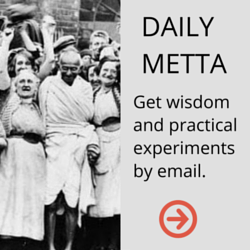June 2:
 “One cannot forgive too much.”
“One cannot forgive too much.”
–Gandhi (Young India, April 2, 1931)
When Gandhi returned to South Africa for his second stay in 1897, he was not a welcomed guest. The South African port and police kept his ship quarantined for close to twenty days just off the Durban shore as a tactic to get him and the other Indians on the boat to go back to India. When the ship was finally allowed to dock, a friend of Gandhi’s came on board and told him not to disembark until nightfall, since there was an angry crowd awaiting him for raising so much “trouble” in the colony. Gandhi felt that secrecy was out of the question and refused to wait until darkness, stepping off the ship in full dignity, dressed proudly in Indian clothing and with wife and children with him. He was immediately surrounded by the angry mob who began to beat him unconscious. He was saved only by Mrs. Alexander, the wife of the police superintendent who happened to pass by and stepped in with her umbrella, getting the men to go away.
The next day, Gandhi was taken to the police station and everyone thought he would press charges against those men who assaulted him. He refused. They pressed him, but he calmly stated his case, which was that these men were simply reacting to propaganda of their government, and it was the system he opposed, not the men who beat him. But he was not naive, either. He knew that by forgoing the opportunity to return an “eye for an eye”–by forgiving the individuals– he was actually speaking to these men at another level, and winning them over. Forgiveness is a powerful tool in nonviolence because when people insult, oppose and try to hurt us, instead of returning the blow, we show them another way. If we try to do nonviolence without forgiveness, the first insult we receive, we’re finished. It requires a strong sense of self to do this.
Experiment in Nonviolence:
Clarify in your own words what forgiveness means to you and how it connects to nonviolent action.
 Daily Metta 2015, a service of the Metta Center for Nonviolence, is a daily reflection on the strategic and spiritual insights of Mahatma Gandhi in thought, word and deed. As Gandhi called his life an “experiment in truth,” we have included an experiment in nonviolence to accompany each Daily Metta. Check in every day for new inspiration. Each year will be dedicated to another wisdom teacher.
Daily Metta 2015, a service of the Metta Center for Nonviolence, is a daily reflection on the strategic and spiritual insights of Mahatma Gandhi in thought, word and deed. As Gandhi called his life an “experiment in truth,” we have included an experiment in nonviolence to accompany each Daily Metta. Check in every day for new inspiration. Each year will be dedicated to another wisdom teacher.








